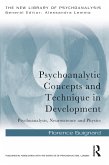Melanie Klein: The Basics provides an accessible and concise introduction to the life and work of Melanie Klein, whose discoveries advanced those of Freud and other analysts, deepening our insight into the unconscious domain of psychology in human beings. Klein began her work by developing a method of psychoanalysis for children, who suffer from anxiety and other, often unrecognised, conflicts, which enabled understanding of those crucial early steps in the development of human mind and identity. Although she initiated one strand of clinical and theoretical developments, many of her discoveries are well-regarded by other schools of psychoanalysis.
The book contains four parts, as well as further reading suggestions and a helpful glossary of key terms. Part I introduces Melanie Klein in the context of her life, her early interest in psychoanalysis and her first discoveries; Part II takes up the development of her technique of child analysis and discusses the ways in which her insights and conclusions in this area influenced the technique of adult analysis and the more general understanding of the human mind; Part III focuses on further scientific and clinical developments in psychoanalytic technique - especially those referring to the understanding and treatment of serious emotional disturbance, e.g. psychosis or affective disorders; Part IV focuses on contemporary developments in Kleinian and post-Kleinian psychoanalysis, considering clinical, cultural, and socio-political applications. Each chapter poses a basic question at the outset, provides an account of how Klein faced this question and worked with it to develop her ideas, and ends by posing a follow up question to be addressed in the subsequent chapter.
This book will greatly appeal to readers from any field seeking a clear and concise introduction to Melanie Klein. It will also interest researchers and professionals working within the field of psychoanalysis seeking a succinct overview of Melanie Klein's contribution.
The book contains four parts, as well as further reading suggestions and a helpful glossary of key terms. Part I introduces Melanie Klein in the context of her life, her early interest in psychoanalysis and her first discoveries; Part II takes up the development of her technique of child analysis and discusses the ways in which her insights and conclusions in this area influenced the technique of adult analysis and the more general understanding of the human mind; Part III focuses on further scientific and clinical developments in psychoanalytic technique - especially those referring to the understanding and treatment of serious emotional disturbance, e.g. psychosis or affective disorders; Part IV focuses on contemporary developments in Kleinian and post-Kleinian psychoanalysis, considering clinical, cultural, and socio-political applications. Each chapter poses a basic question at the outset, provides an account of how Klein faced this question and worked with it to develop her ideas, and ends by posing a follow up question to be addressed in the subsequent chapter.
This book will greatly appeal to readers from any field seeking a clear and concise introduction to Melanie Klein. It will also interest researchers and professionals working within the field of psychoanalysis seeking a succinct overview of Melanie Klein's contribution.
"If you are looking for a clear and concise introduction to Melanie Klein, this book is for you. It will also be for anyone who wants a succinct overview of Melanie Klein's contribution to psychoanalysis and her framework of concepts."
-In Mind, The Tavistock and Portman NHS Foundation Trust
-In Mind, The Tavistock and Portman NHS Foundation Trust








